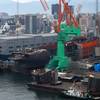US to Build Temporary Port to Deliver Gaza Aid
President Joe Biden will announce in his State of the Union speech on Thursday that the U.S. military will construct a temporary port on Gaza's Mediterranean coast to receive humanitarian aid by sea, senior administration officials said.
Planning for the operation, initially based on the island of Cyprus, does not envisage the deployment of U.S. military personnel in Gaza, the officials told a news briefing.
The officials also said that Hamas is delaying a new deal with Israel on a six-week ceasefire and the release of hostages because the Islamists who rule Gaza have not agreed to free sick and elderly captives.
The deal "is on the table now and has been for more than the past week," said an official, referring to stalled negotiations in Egypt, adding that the temporary ceasefire is needed "to bring immediate relief to the people of Gaza."
Hamas blamed the stalemate on Israel's rejection of its demands to end its offensive and withdraw its forces.
Biden's decision to order the construction of the temporary port comes amid U.N. warnings of widespread famine among the enclave's 2.3 million Palestinians after nearly five months of fighting between Israeli troops and Hamas.
A staunch supporter of Israel, Biden faces rising political pressure to end the Israeli offensive, including a protest movement for Democratic voters to withhold their support for the president in his party primaries for November's general election.
Large swaths of Gaza have been destroyed and most of the population displaced by intense Israeli bombardments and fighting ignited by Hamas's Oct. 7 onslaught into Israel.
Israel says Hamas' incursion claimed 1,200 lives and saw the Islamists abduct 253 hostages. Gaza health officials say the number of people killed in the subsequent offensive launched by Israel has surpassed 30,800.
A port in Gaza
Biden will tell Congress he is ordering the U.S. military "to undertake an emergency mission to establish a port in Gaza, working with like-minded countries and humanitarian partners," one official said.
The facility would accommodate large ships carrying food, water, medical supplies and temporary shelters.
Washington will work with European and regional partners and allies to build an international coalition of countries that would contribute capabilities and funds, the officials said.
An Israeli official said Israel “fully supports the deployment of a temporary dock” on Gaza’s coast and the operation “will be carried out with full coordination between the two parties.”
While Israel is increasing the number of aid-bearing trucks allowed into the besieged enclave and the United States and other countries have been airdropping supplies, the amounts of assistance getting in are insufficient, the official said.
"We're not waiting for the Israelis" to allow in more aid, the official continued. "This is a moment for American leadership."
The temporary port would increase humanitarian assistance to Palestinians in the war-battered enclave by "hundreds of additional truckloads" per day, the official said, adding that the United States would coordinate security with Israel.
It also would work with the U.N. and humanitarian aid organizations that "understand the distribution of assistance within Gaza," the official said.
The official said the operation would "take a number of weeks to plan and execute" and that the U.S. forces required for it are in the region or would soon begin moving there.
The U.S. operation would build on a Cypriot government initiative, which calls for collecting humanitarian aid in the island's port city of Larnaca, 210 nautical miles from Gaza, the officials said.
That would permit Israeli officials to screen shipments before they are transported to Gaza.
While the temporary port in Gaza would initially be a military-run operation, Washington envisions it becoming a commercially run facility, the official said.
(Reuters - Reporting by Steve Holland, Jonathan Landay, Katharine Jackson; Additional reporting by Matt Spetalnik; Editing by Trevor Hunnicutt, Alexandra Hudson and Daniel Wallis)








